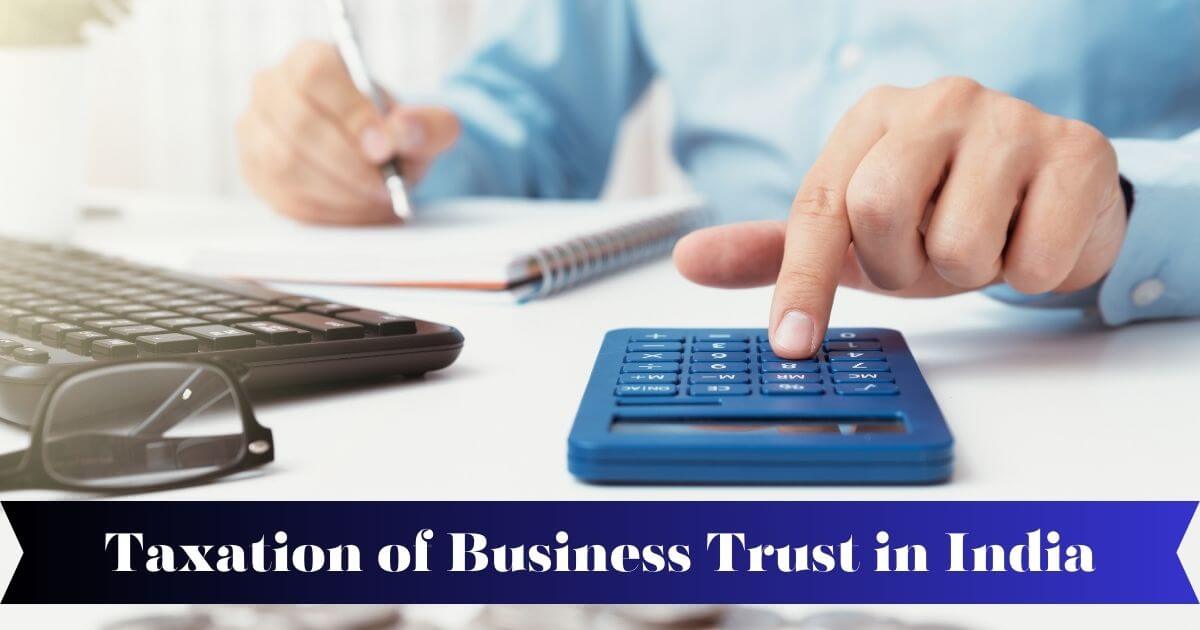Taxation of Business Trust in India – A Detailed Guide on How the Unit Holders in Business Trusts are Taxed

As we progress, new investment avenues are emerging and are becoming popular among investors. New ways of conducting business and raising finances are on the rise and what follows are the taxation provisions. Business trust is one such concept that has become mainstream in the last few years. It is similar to the concept of mutual funds but operates in a specific niche and is taxed separately as per the provisions of the Income Tax Act, 1961. Let’s decode the taxability of business trust. We will also see how the unit holders in business trusts are taxed.
What is a Business Trust?
A business trust is defined under section 2(13A) of the Income Tax Act, 1961 as a trust registered as:
- An Infrastructure Investment Trust (InvIT) under the Securities and Exchange Board of India (Infrastructure Investment Trusts) Regulations, 2014 made under the Securities and Exchange Board of India Act, 1992 (15 of 1992); or
- A Real Estate Investment Trust (REIT) under the Securities and Exchange Board of India (Real Estate Investment Trusts) Regulations, 2014 made under the Securities and Exchange Board of India Act, 1992 (15 of 1992).
How Does Business Trust Operates?
To understand the taxation of business trust, we first need to check the sources of income of business trust. A business trust derives income from the following sources:
- Shares of SPV
- Rental income from properties
- Capital gains on transfer of assets of business trust
- Interest on loans to SPV
As stated earlier, REITs and InvITs are considered as business trusts and operate like mutual funds. They pool money from the investors against the issue of units of business trust. The money pooled is invested in real estate and infrastructure projects respectively. The returns earned from these investments are passed on to the unit holders.
When we understand the REITs, it is equally important to understand the concept of Special Purpose Vehicle (SPV). REITs may hold their real estate projects on their own or by forming the SPVs. SPV is a domestic company in which the business trust holds the controlling stake (usually more than 50%). SPV holds the real estate assets on behalf of the REITs.
Taxation of Business Trust in India
Till now, we have understood the modus operandi of the business trust. Now, we can look at the taxation of business trust in India as per the provisions of the Income Tax Act, 1961.
- Section 10(23FC) – Exemption to Business Trust
The following income earned by the business trust shall be exempted from tax in the hands of the business trust:
- Interest from the SPV or
- Dividend from the SPV
- Section 10(23FCA) – Exemption to Business Trust
An income of a Real Estate Investment Trust by way of leasing or renting or letting out of any real estate asset directly owned by such business trust should be exempt from tax.
- Section 10(23FD) – Exemption to Unit holders of Business Trust
Any income of the nature referred to in Section 115UA received by the unit holder from the business trust, not being of the nature referred to in Section 10(23FC) or 10(23FCA), shall be exempt in the hands of the unit holders.
Analysis of Taxability of Various Income of Business Trust
The taxability of various incomes of business trust is as follows:
- Interest and dividend income from SPV are exempt in the hands of the business trust.
- Rental income is exempt for REITs.
- Long term capital gains shall be taxable @10% for non-resident unit holders and 20% for resident unit holders. For the purpose of long-term capital gains, the holding period should be more than 36 months.
- Short term capital gains shall be taxable @30% for residents and 40% for non-resident corporates.
- The other income of the business trust shall be taxable at the Maximum Marginal Rate @42.7%.
Analysis of Taxability for Unit Holders
Following is the taxability of various income of unit holders in business trust:
- Any income received by the unit holders from the business trust should be of the same nature and proportion in the hands of the unit holder as it was for the business trust.
- Income received by the unit holders from the business trust, other than the interest and rental income, shall be exempt for the unit holders.
- Dividends distributed by the business trust to the unit holders shall be taxable for unit holders.
- Short term capital gains on the transfer of units of business trust by the unit holders where STT is paid shall be taxable at 15% as per Section 111A.
- Long term capital gains on transfer of units of business trust by the unit holders where STT is paid shall be taxed @10% on gains exceeding Rs. 1,00,000.
Summing Up
While the taxation of business trusts might seem complex, the government has carefully crafted the provisions to avoid any instances of double taxation. As per the taxation provisions of a business trust, the income that is taxed in the hands of the business trust is exempted in the hands of unit holders. Conversely, all income that is exempted in the hands of business trust remains taxable for unit holders. In case you need any assistance in relation to the taxability of business trust in India, feel free to contact the ASC Group.
Must, Read "Taxation of Private (Family) Trusts"

Leave a Reply